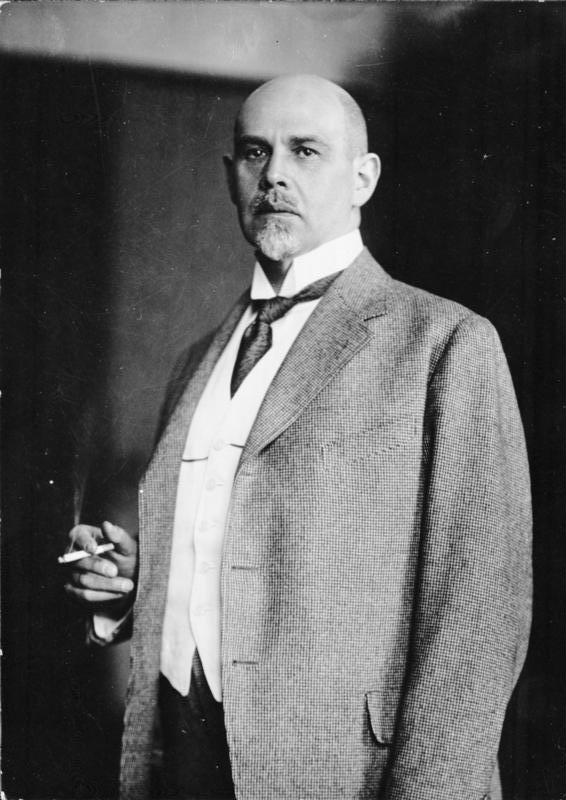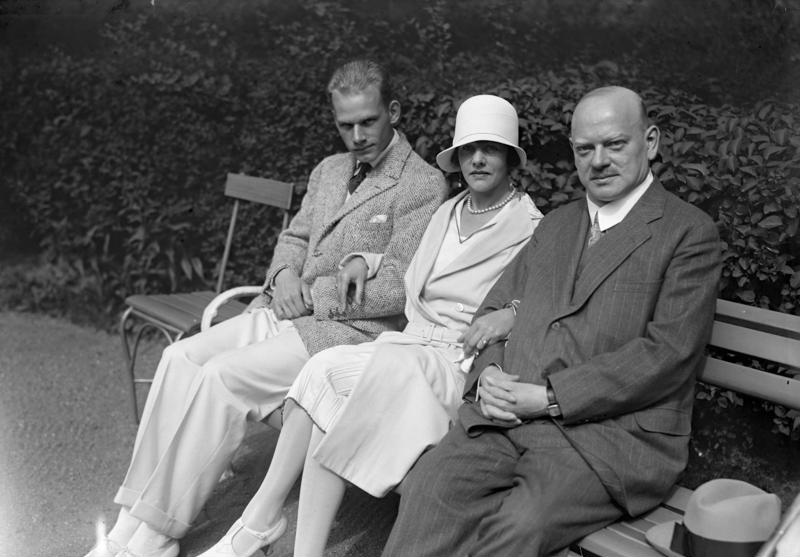|
Albrecht Von Graefe (politician)
Albrecht von Graefe (1 January 1868 – 18 April 1933) was a German landowner and right-wing politician active both during the German Empire and the Weimar Republic. Although never a member of the Nazi Party he was an early associate of Adolf Hitler and for a while appeared a credible rival for the leadership of the overall Völkisch movement. Early career The son of the celebrated ophthalmologist Albrecht von Graefe, and thus grandson of the surgeon Karl Ferdinand von Graefe, he enlisted in the German Imperial Army as an officer in 1887.Detlef Mühlberger, ''Hitler's Voice: The Völkischer Beobachter, 1920-1933. Organisation & Development of the Nazi Party, Volume 1'', Peter Lang, 2004, p. 103 After his military service von Graefe entered politics and served as a deputy in the Reichstag for the German Conservative Party from 1912 to 1918. Rise to prominence Von Graefe returned to the Reichstag in 1920 as member of the German National People's Party (DNVP). A close asso ... [...More Info...] [...Related Items...] OR: [Wikipedia] [Google] [Baidu] |
Berlin
Berlin ( , ) is the capital and largest city of Germany by both area and population. Its 3.7 million inhabitants make it the European Union's most populous city, according to population within city limits. One of Germany's sixteen constituent states, Berlin is surrounded by the State of Brandenburg and contiguous with Potsdam, Brandenburg's capital. Berlin's urban area, which has a population of around 4.5 million, is the second most populous urban area in Germany after the Ruhr. The Berlin-Brandenburg capital region has around 6.2 million inhabitants and is Germany's third-largest metropolitan region after the Rhine-Ruhr and Rhine-Main regions. Berlin straddles the banks of the Spree, which flows into the Havel (a tributary of the Elbe) in the western borough of Spandau. Among the city's main topographical features are the many lakes in the western and southeastern boroughs formed by the Spree, Havel and Dahme, the largest of which is Lake Müggelsee. Due to its l ... [...More Info...] [...Related Items...] OR: [Wikipedia] [Google] [Baidu] |
Ophthalmologist
Ophthalmology ( ) is a surgery, surgical subspecialty within medicine that deals with the diagnosis and treatment of eye disorders. An ophthalmologist is a physician who undergoes subspecialty training in medical and surgical eye care. Following a medical degree, a doctor specialising in ophthalmology must pursue additional postgraduate residency (medicine), residency training specific to that field. This may include a one-year integrated internship that involves more general medical training in other fields such as internal medicine or general surgery. Following residency, additional specialty training (or fellowship) may be sought in a particular aspect of eye pathology. Ophthalmologists prescribe medications to treat eye diseases, implement laser therapy, and perform surgery when needed. Ophthalmologists provide both primary and specialty eye care - medical and surgical. Most ophthalmologists participate in academic research on eye diseases at some point in their training an ... [...More Info...] [...Related Items...] OR: [Wikipedia] [Google] [Baidu] |
Beer Hall Putsch
The Beer Hall Putsch, also known as the Munich Putsch,Dan Moorhouse, ed schoolshistory.org.uk, accessed 2008-05-31.Known in German as the or was a failed coup d'état by Nazi Party ( or NSDAP) leader Adolf Hitler, Erich Ludendorff and other leaders in Munich, Bavaria, on 8– 9 November 1923, during the Weimar Republic. Approximately two thousand Nazis marched on the , in the city centre, but were confronted by a police cordon, which resulted in the deaths of 16 Nazi Party members and four police officers. Hitler escaped immediate arrest and was spirited off to safety in the countryside. After two days, he was arrested and charged with treason. The putsch brought Hitler to the attention of the German nation for the first time and generated front-page headlines in newspapers around the world. His arrest was followed by a 24-day trial, which was widely publicised and gave him a platform to express his nationalist sentiments to the nation. Hitler was found guilty of treason ... [...More Info...] [...Related Items...] OR: [Wikipedia] [Google] [Baidu] |
Joseph Wirth
Karl Joseph Wirth (6 September 1879 – 3 January 1956) was a German politician of the Catholic Centre Party who served for one year and six months as the chancellor of Germany from 1921 to 1922, as the finance minister from 1920 to 1921, as acting foreign minister of Germany from 1921 to 1922 and again in 1922, as the minister for the Occupied Territories from 1929 to 1930 and as the minister of the Interior from 1930 to 1931. During the postwar era, he participated in the Soviet and East German Communist-controlled neutralist Alliance of Germans party from 1952 until his death in 1956. Early life Joseph Wirth was born on 6 September 1879 in Freiburg im Breisgau, in what was then the Grand Duchy of Baden, the son of the ''Maschinenmeister'' (working engineer) Karl Wirth and his wife Agathe (née Zeller). According to Wirth himself, the Christian and social involvement of his parents had a strong impact on him. From 1899 to 1906 he studied mathematics, natural sciences and e ... [...More Info...] [...Related Items...] OR: [Wikipedia] [Google] [Baidu] |
Walther Rathenau
Walther Rathenau (29 September 1867 – 24 June 1922) was a German industrialist, writer and liberal politician. During the First World War of 1914–1918 he was involved in the organization of the German war economy. After the war, Rathenau served as German Foreign Minister (February to June 1922) of the Weimar Republic. Rathenau initiated the 1922 Treaty of Rapallo, which removed major obstacles to trading with Soviet Russia. Although Russia was already aiding Germany's secret rearmament programme, right-wing nationalist groups branded Rathenau a revolutionary, also resenting his background as a successful Jewish businessman. Two months after the signing of the treaty, Rathenau was assassinated by the right-wing paramilitary group Organisation Consul in Berlin. Some members of the public viewed Rathenau as a democratic martyr; after the Nazis came to power in 1933 they banned all commemoration of him. Early life Rathenau was born in Berlin to Emil Rathenau, a prominent ... [...More Info...] [...Related Items...] OR: [Wikipedia] [Google] [Baidu] |
Wilhelm Henning
Wilhelm Henning (26 July 1879 in Bruchsal, Baden - 24 October 1943 in Lichterfelde, Berlin) was a German military officer and right-wing politician. Military service Henning enlisted as an officer in the German Imperial Army and remained until 1919 when he retired with the rank of Major.Detlef Mühlberger, ''Hitler's Voice: The Völkischer Beobachter, 1920-1933. Organisation & Development of the Nazi Party, Volume 1'', Peter Lang, 2004, p. 239 From 1917 he served in the War Ministry and was moved to St Petersburg in 1918. Politics Entering politics, Henning joined the conservative German National People's Party (DNVP) and was elected to the Reichstag in 1920. From the start Henning was on the extreme anti-Semitic and was close to the likes of Albrecht von Graefe, Reinhold Wulle and Richard Kunze, although the latter split from the DNVP in 1921 to form his own ''Deutschsoziale Partei''. Rathenau controversy Henning became notorious for an article of his that appeared in the Ju ... [...More Info...] [...Related Items...] OR: [Wikipedia] [Google] [Baidu] |
Gustav Stresemann
Gustav Ernst Stresemann (; 10 May 1878 – 3 October 1929) was a German statesman who served as chancellor in 1923 (for 102 days) and as foreign minister from 1923 to 1929, during the Weimar Republic. His most notable achievement was the reconciliation between Germany and France, for which he and French Prime Minister Aristide Briand received the Nobel Peace Prize in 1926. During a period of political instability and fragile, short-lived governments, he was the most influential cabinet member in most of the Weimar Republic's existence. During his political career, he represented three successive liberal parties; he was the dominant figure of the German People's Party during the Weimar Republic. Early years Stresemann was born on 10 May 1878 in 66 Köpenicker Straße in Southeast Berlin, the youngest of seven children. His father worked as a beer bottler and distributor, and also ran a small bar out of the family home, as well as renting rooms for extra money. The family was ... [...More Info...] [...Related Items...] OR: [Wikipedia] [Google] [Baidu] |
Liberalism
Liberalism is a political and moral philosophy based on the rights of the individual, liberty, consent of the governed, political equality and equality before the law."political rationalism, hostility to autocracy, cultural distaste for conservatism and for tradition in general, tolerance, and ... individualism". John Dunn. ''Western Political Theory in the Face of the Future'' (1993). Cambridge University Press. . Liberals espouse various views depending on their understanding of these principles. However, they generally support private property, market economies, individual rights (including civil rights and human rights), liberal democracy, secularism, rule of law, economic and political freedom, freedom of speech, freedom of the press, freedom of assembly, and freedom of religion. Liberalism is frequently cited as the dominant ideology of modern times.Wolfe, p. 23.Adams, p. 11. Liberalism became a distinct movement in the Age of Enlightenment, gaining popularity ... [...More Info...] [...Related Items...] OR: [Wikipedia] [Google] [Baidu] |
Anti-Semitic
Antisemitism (also spelled anti-semitism or anti-Semitism) is hostility to, prejudice towards, or discrimination against Jews. A person who holds such positions is called an antisemite. Antisemitism is considered to be a form of racism. Antisemitism has historically been manifested in many ways, ranging from expressions of hatred of or discrimination against individual Jews to organized pogroms by mobs, police forces, or genocide. Although the term did not come into common usage until the 19th century, it is also applied to previous and later anti-Jewish incidents. Notable instances of persecution include the Rhineland massacres preceding the First Crusade in 1096, the Edict of Expulsion from England in 1290, the 1348–1351 persecution of Jews during the Black Death, the massacres of Spanish Jews in 1391, the persecutions of the Spanish Inquisition, the expulsion from Spain in 1492, the Cossack massacres in Ukraine from 1648 to 1657, various anti-Jewish pogroms in the Russ ... [...More Info...] [...Related Items...] OR: [Wikipedia] [Google] [Baidu] |
Racism
Racism is the belief that groups of humans possess different behavioral traits corresponding to inherited attributes and can be divided based on the superiority of one race over another. It may also mean prejudice, discrimination, or antagonism directed against other people because they are of a different race or ethnicity. Modern variants of racism are often based in social perceptions of biological differences between peoples. These views can take the form of social actions, practices or beliefs, or political systems in which different races are ranked as inherently superior or inferior to each other, based on presumed shared inheritable traits, abilities, or qualities. There have been attempts to legitimize racist beliefs through scientific means, such as scientific racism, which have been overwhelmingly shown to be unfounded. In terms of political systems (e.g. apartheid) that support the expression of prejudice or aversion in discriminatory practices or laws, racist ideology ... [...More Info...] [...Related Items...] OR: [Wikipedia] [Google] [Baidu] |
Far Right
Far-right politics, also referred to as the extreme right or right-wing extremism, are political beliefs and actions further to the right of the left–right political spectrum than the standard political right, particularly in terms of being radically conservative, ultra-nationalist, and authoritarian, as well as having nativist ideologies and tendencies. Historically, "far-right politics" has been used to describe the experiences of Fascism, Nazism, and Falangism. Contemporary definitions now include neo-fascism, neo-Nazism, the Third Position, the alt-right, racial supremacism, National Bolshevism (culturally only) and other ideologies or organizations that feature aspects of authoritarian, ultra-nationalist, chauvinist, xenophobic, theocratic, racist, homophobic, transphobic, and/or reactionary views. Far-right politics have led to oppression, political violence, forced assimilation, ethnic cleansing, and genocide against groups of people based on their supposed ... [...More Info...] [...Related Items...] OR: [Wikipedia] [Google] [Baidu] |









